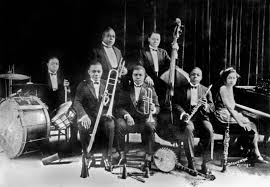Time Period: 19th Century, 20th Century, Civil Rights Movement, Postwar, Progressive Era, WWII
Topic: Community and Reform, Culture, Industrialization and Labor, Politics, Race and Ethnicity

Jazz music began in New Orleans, Louisiana. The musical genre has roots in European traditions, blues, and ragtime. It also derives from work songs sung by slaves on southern plantations. Jazz was not a popular musical genre until the 20th century when African Americans moved to Chicago during the Great Migration to escape the Jim Crow South. The geography and location of the city of Chicago boosted jazz to become one of the most popular musical genres of its time. Without Chicago, jazz music would have never become the influential and groundbreaking style that it is today.
During the temperance movement, Chicago was home to over 7,000 speakeasies.1 Owners of the illegal establishments would often hire local black jazz artists to entertain guests as they drank. Jazz was loved by both black and white audiences. It began to popularize even more in the city after the invention of electric recording and radio broadcasting. By the late 1920’s, Chicago became known as “America’s Jazz Capital.”2 Chicago emerged as a radio broadcasting center. Radio stations like NBC and CBS, played jazz music on the airways reaching listeners on both the east and west coasts of the United States. The more jazz spread, the more it rose in demand. Big bands started to pop up all across the city of Chicago performing in nightclubs and big concert halls. Chicago jazz icons like King Oliver and Art Tatum would perform for months at a time, fulling residencies at celebrated night clubs.
Some of the most famous jazz musicians owe their success to the city of Chicago. Art Tatum is considered the greatest jazz pianist in America. The blind artist played in large crows at night clubs in Chicago. He even had a residence at the Three Deuces nightclub where he headlined for six months.3
Jazz played an important role in the social and political realms in Chicago. White Americans loved jazz music, because of this white musicians studied black artists and tried to copy it so they could benefit from the high demand. White musicians did extremely well in the music industry playing jazz music. Many people were unaware that the creators of the music genres were African Americans. Discrimination was prevalent in Chicago. Radio stations did not give equal amounts of airtime to musicians. They favored white jazz players over black jazz players. Black artists did not receive compensation or recognition for being the true creators of the musical genre. Black jazz players continued to create new jazz styles in response to the lack of recognition. Many jazz artists of this era were addicted to drugs like heroin and cocaine.4 Artists like Charlie Parker attribute drugs to their successful careers.
During World War II and the Civil Rights Era jazz helped boosts spirits during hardship. Soldiers would listener to jazz music as a way to lift soldier morale while they were away at battle. Civil Rights activists used jazz to show the mistreatment of black people in America. Today, jazz continues to be an important part of the Chicagoan culture. Every year, Chicago host the Chicago Jazz Festival which showcases some of the best jazz musicians from the city. 
______________________
1 “Woodrow Wilson.” Facts about Speakeasies: Prohibition History for Kids ***. January 09, 2018. Accessed April 20, 2019. http://www.american-historama.org/1913-1928-ww1-prohibition-era/speakeasies.htm.
2“The Rise of Jazz and Jukeboxes – Prohibition: An Interactive History.” Prohibition. Accessed April 20, 2019. http://prohibition.themobmuseum.org/the-history/how-prohibition-changed-american-culture/jazz-and-jukeboxes/.
3 “Tatum, Art.” “Tatum, Art.” Contemporary Musicians. 2019. Accessed April 20, 2019. https://www.encyclopedia.com/people/literature-and-arts/music-popular-and-jazz-biographies/art-tatum.
4 Larry Getlen. “Charlie Parker’s Heroin Addiction Helped Make Him a Genius.” New York Post. February 05, 2017. Accessed April 20, 2019. https://nypost.com/2017/02/05/charlie-parkers-heroin-addiction-helped-make-him-a-genius/.
